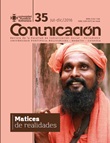Medellín Cuenta con vos: El papel cambiante de voseo en la comunicación escrita
Contenido principal del artículo
Resumen
Voseo—the linguistic phenomenon of using subject vos and/or its corresponding verb forms and complements—is common in speech in Antioquia, Colombia, but it is non-normative for writing. Nonetheless, written voseo has a burgeoning presence in public in Medellín and has become the preferred form of address of the new mayoral administration (2016). Given the intimate link between language and culture, and Medellín’s 21st century transformation, it is logical that an increase in the prestige of Medellín on the national and international stage could result in increased prestige for its local dialect, emphasizing here the regional voseo. This study analyzes the Facebook posts of the Alcaldía de Medellín for its first seven months (January-July, 2016). The author read and documented the 667 messages posted during that time. Each use of an address form was documented for the data presentation. The monthly totals of address forms show a growing trend of voseo usage and a decline in tuteo and hybrid forms. This increased use of voseo is examined through the lens of language change. For a language change to occur, some agent of change must introduce it. We propose that the Alcaldía de Medellín could possibly be the required agent that would marshal in a linguistic change, resulting in increased prestige for colloquial voseo in writing.
Citas
City of the year. (2013, 1 de marzo). Wall Street Journal. Retrieved from http://online.wsj. com/ad/cityoftheyear .
Fishman, J. (1960). A systemization of the Whorfian hypothesis. Behavioral Science, 5(4), 323-339.
Fontanella de Weinberg, M. (1990-1991). La generalización del voseo y la estandardización policéntrica del español bonaerense del siglo XX. Cuadernos del Sur, 23(24), 35-49.
Hymes, D. (1974). Foundations of sociolinguistics: an ethnographic approach. Philadelphia: University of Pennsylvania.
Jang, J. (2010). Fórmulas de tratamiento pronominales en los jóvenes universitarios de Medellín (Colombia) desde la óptica sociopragmática: estrato socioeconómico y sexo. Íkala, 15(26), 43-116.
Jang, J. (2013). Voseo medellinense como expresión de identidad paisa. Íkala, 18(1), 61-81. Labov, W. (2001). Principles of Linguistic Change. Social Factors. Cambridge, Massachusetts: Blackwell.
Lipski, J. (1994). Latin American Spanish. New York: Longman.
Millán, M. (2011). Pronouns of address in informal contexts: a comparison of two dialects of Colombian Spanish. (Unpublished doctoral dissertation). University of Illinois-Urbana Champaign, USA.
Milroy, J., & Milroy, L. (1985). Linguististic change, social network and speaker innovation. Journal of Linguistics, 21(2), 339-384.
Molina, I. (1993). Las fórmulas de tratamiento de los jóvenes madrileños: estudio sociolingüístico. LEA: Lingüística española actual, 15(2), 249-263.
Montes Giraldo, J. (1967). Sobre el voseo en Colombia. Thesaurus, 22(1), 21-44.
Penny, R. (2000). Variation and change in Spanish. Cambridge, UK: Cambridge University Press.
Saville-Troike, M. (1989). The ethnography of communication: An introduction. 2nd ed.
Cambridge, Massachusetts: Blackwell.
Villa Mejía, V. (2010). La solidaridad y poder del vos antioqueño. Lingüística. y literatura (58), 69-85.
Weyers, J. (2016). Making the case for increased prestige of the vernacular: Medellín’s voseo. In M. Moyna & S. Rivera (Eds.), Forms of address in the Spanish-speaking world (pp. 287-302). New York: John Benjamins.

